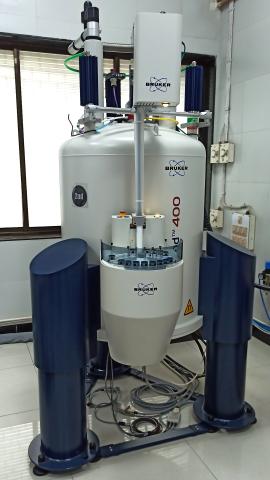
.
Category
- Spectroscopy and Spectrometry » NMR Spectroscopy
Booking Details
Facility Management Team and Location
Facility Features, Working Principle and Specifications
Facility Description
This facility provides advanced capabilities for the analysis of liquid samples and real-time reaction monitoring.
Advanced Probes
- 5 mm Multinuclear i-Probe: Designed for liquid-state studies of nuclei such as ^1H, ^13C, ^19F, ^31P, ^11B, ^27Al, ^77Se, ^125Te, ^199Hg, and more.
- 5 mm Double Resonance ^13C/^1H Probe: Optimized for experiments requiring simultaneous detection of ^1H and ^13C nuclei.
Experiment Capabilities
- 1D NMR: Includes experiments like ^1H, ^13C, NOE, APT, DEPT, and more.
- 2D NMR: Supports advanced techniques such as COSY, NOESY, TOCSY, HSQC, HMBC, DOSY, and ROESY.
- Variable Temperature (VT): Enables experiments in the temperature range of -40°C to +100°C.
Sample Types
- Liquid Samples: Requires samples to be soluble in 0.6 mL of a suitable solvent.
- Real-Time Reaction Monitoring: Enables kinetic studies and process optimization with in situ monitoring.
- 24-Sample Auto-Sampler: Facilitates high-throughput analysis by automating the handling of up to 24 samples.
The spectrometer uses Fourier Transform Nuclear Magnetic Resonance (FT-NMR) to provide high-resolution spectra, offering insights into molecular structure, dynamics, and interactions. Real-time reaction monitoring integrates seamlessly, enabling simultaneous acquisition of kinetic data and structural information.
The system features robust hardware for long-term stability, advanced cryogenics for temperature regulation, and state-of-the-art software for data acquisition and analysis.
Instructions for Registration, Sample Preparation, User Instructions and Precautionary Measures
1: Submit an Official Request Letter
- The letter must be on your institution's official letterhead.
- It should be signed by the Head of Department (HoD) or Research Guide.
- The letter must confirm that the analysis is for research purposes (to qualify for academic concessions).
2: Address the Letter To
The Head, Department of Chemistry, IIT Bombay.
3: Include the Following Details in the Letter
- Type of Solution NMR Analysis Required
- Mention the nuclei for analysis (e.g., ¹H, ¹³C, ³¹P, ¹⁹F, etc.).
- Type of Experiment Required
- Specify the required experiment (e.g., 1D NMR: ¹H, ¹³C, DEPT, APT, or 2D NMR: COSY, NOESY, HSQC, HMBC, DOSY, etc.).
- Sample Details
- Provide details such as:
- Solvent Used (e.g., CDCl₃, D₂O, DMSO-d₆, etc.)
- Sample Concentration
- Any Special Handling Requirements
- industrial research needs.
- Provide details such as:
- Ensure complete solubility in 0.6 mL of the selected solvent.
- Required amounts:
- 1H NMR: 10-20 mg (depending on molecular weight).
- 13C NMR: 20-30 mg for adequate signal-to-noise ratio.
BBefore Using the Facility:
- Read and understand the instrument manual and SOPs.
- Prepare the sample in a deuterated solvent (e.g., CDCl₃, D₂O, DMSO-d₆) to ensure proper locking and shimming.
- Filter the sample, if necessary, to remove insoluble particles that could interfere with the experiment.
- Use a clean and undamaged NMR tube with the correct length and thickness.
During Experiments:
- Handle NMR tubes carefully to prevent breakage.
- Insert the NMR tube gently into the spinner to avoid misalignment.
- Do not exceed the recommended sample volume (typically 0.6 mL for standard 5 mm tubes).
- Ensure proper shimming and tuning before starting data acquisition.
After Using the Facility:
- Remove the sample from the spectrometer and clean any spills.
- Collect your NMR spectra and save the data for future reference.
- Retrieve your unused sample material and dispose of waste properly.
Report any instrument issues or irregularities to the lab personnel.
Important Note for External Users:
- External users are NOT allowed to operate the instrument.
- Only authorized facility personnel will handle the sample preparation, experiment setup, and data acquisition for external users.
- External users must submit their samples along with a properly filled analysis request form and the required payment (if applicable).
- Users will receive the processed data once the analysis is complete.
Charges for Analytical Services in Different Categories
400 MHz NMR II (CHARGES)
Expt. type | Internal | University (X) | National Labs (3X) | Industries (5X) | |
| Chemistry Dept. | Other IITB Departments (X) |
|
|
|
1H | 50 | 100 | 100 | 300 | 500 |
X-nuclei | 50 | 200 | 200 | 600 | 1000 |
Subsequent hour | 50 | 150 | 150 | 450 | 750 |
2D NMR | 50 | 300 | 300 | 900 | 1500 |
Additional Charges for Variable temp. (Solution/Solid) | 50 | 250 | 250 | 750 | 1250 |
Applications
- Major application of NMR spectroscopy lies in the area of synthetic organic chemistry, inorganic chemistry, bio-organic chemistry, bio-inorganic chemistry, polymer chemistry and organometallic chemistry. One of the main advantages of FT-NMR spectroscopy is that a number of FIDs can be accumulated and Fourier transformed, enhancing S/N ratio of the spectrum. This in turn facilitates the analysis of samples with low abundant nuclei and smaller gyro-magnetic ratios, e.g.,13C, 29Si, 15N etc.
- NMR studies find applications in some of following areas :
- Molecular conformation in solution
- Quantitative analysis of mixtures containing known compounds
- Determining the content and purity of a sample
- Through space connectivity (Overhauser effect)
Sample Details
NA
NA
NA
NA
NA
NA
NA
